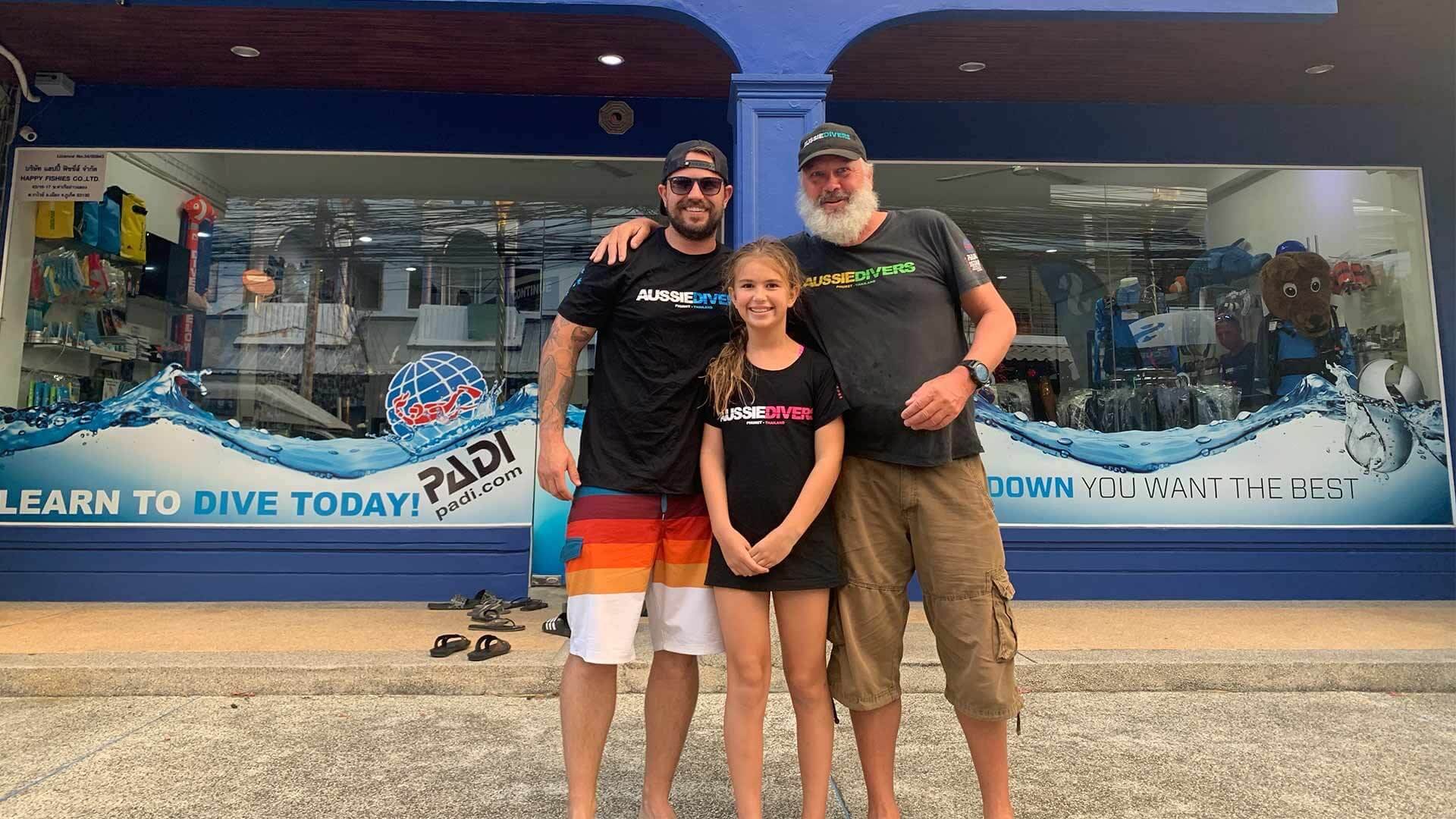What age can children start scuba diving?
When I started with the idea of writing this blog I thought the answer to this question would be relatively a simple one. However, with even a small amount of research the answer is a lot more complicated than I imagined. There are a whole lot of different experts having a vast range of different views on the subject on what age children can start scuba diving.
Most of these concerns are around physical, psychological and maturity preparedness.
PADI’s Age Limit
What I considered to be the simple answer was 10 years of age. PADI have set the age limit for both their PADI Discover Scuba Diving and their entry level Certification, the PADI Open Water Course at 10 years. Our insurance policy and I would suggest a lot of other insurance companies are set at 10 years as well. PADI do have different safety requirements for 10 – 11 years olds. They are mostlysupervision and depth requirements and limitations.
PADI have been certifying divers for more than 50 years. They have some of the best recourses and historical data to refer to. They have excellent training departments and safety departments and have divers safety at their foremost. With that amount of experience and years of testing and data, one would assume that the 10 years age bracket is an acceptable and same one.
The WRSTC (World Recreational Scuba Training Council) and the RSTC (Recreational Scuba Training Council) are organizations that bring all recognized scuba training organizations together. They share intel and data regarding safety. The scuba training organizations then set some training regulations to a unified standard. The WRSCT and RSTC have left the minimum age questions up to the individual training organizations. For the record, the other main training organizations have the following minimum ages SSI, NAUI, BESAC, SDI and all set at 10 years, CMAS is 8 years of age.
My involvement in the scuba diving industry as instructor is coming up to 12 years. During that time I would have been involved in excess of one hundred 10/11 year old students without incident. Some of my favourite teaching day have been with children. Teaching a child to scuba dive can be as rewarding for the instructor as it is for the student.
The ability to share family activities is also a positive. We have had three generations of families diving together and I can’t imagine a better family activity.
Responsibly for themselves and a buddy is another useful attribute and the basic understanding of physic, physiology and natural science is above that of a normal child.
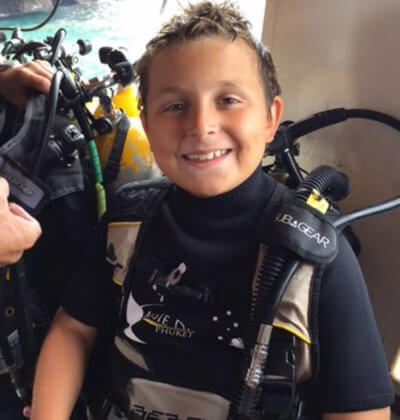
10 Year old Will on his fist dive
DAN (Divers Alert Network) are the world authority on scuba diving medical issues. They have a very interesting page dedicated to minimum age for scuba diving.
http://www.alertdiver.com/Children_and_Diving
Natalie Gibb on liveabout.com also writes an informative blog.
https://www.liveabout.com/is-scuba-diving-safe-for-kids-2963213
The common concerns fall into similar categories.
Does the Child Want to Dive?
Dr. Simon Mitchell in the DAN article states that this is he most important factor. He states: The most important thing is that the child wants to dive. It is also vitally important that the parents are supportive and wholly involved in the decision to allow diving, acting as informed risk-acceptors on the child’s behalf.
As a dive professional that would be my minimum requirement. I basically interview the student when I meet then. Not an interrogation, but a few simple questions to understand the child’s reason for doing he course.
Medical Concerns
Unfortunately there has never been and an most likely never will be hyperbaric tests on children. As Gibb states this would be ethically unethical and therefor most medical concerns are untested and thus, creates debate in what may or may not happen. Because there is no concrete evidence this does not mean that some concerns should not be addressed.
DAN do ask the question about decompression stress and long term bone development. Although there is no evidence of this, it is a concern by some experts.
The topic of ears and equalization is an interesting one. There may be some issues with the Eustachian Tubes in children maybe under developed and make it difficult to equalize on descent. The inability to equalize is a regular issue with adults and during any dive that there are problems with equalizing the dive should be aborted. This would be no different with young children. A knowledgably, professional and caring scuba diving instructor and accompanying parent should be able to control this.
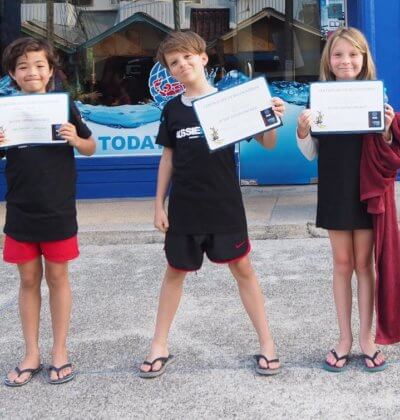
Children Scuba Diving Aussie Divers Phuket
Also on the ears, one article did mention, although very rare, some scuba diving ear injuries can lead to permanent ear injuries and questioned the ethical morals of placing a child at risk of permanent ear damage.
The Mental Maturity of the Child.
To quote the DAN article “Children often lack the mental maturity to understand and manage invisible risks, and they can behave unpredictably in stressful circumstances. Adherence to plans can be a problem for those who are easily distracted.”
The article also mentions, a lessened ability to problem solve and being easily distracted. King in her article makes the following statement; “If a child is likely to have a nonchalant attitude about diving safety, it may be best to keep him out of the water.”
The mental maturity of a child should be addressed. From my personal instructor and dive shop owner perspective, my concerns are best waned if the child comes from a scuba diving family. The family already know the dangers of scuba diving and they best know their child. Although, scuba diving parents approval is highly accepted, normal dive shop managerial and scuba instructor concerns should still be addressed.
My concerns are normally addressed in this manner. It is very rare that I accept any child (10 – 15) do a beginner activity without adult supervision. I consider this mandatory. If the child is young and is doing a PADI Discover Scuba Diving experience, a parent must accompany them to the free pool session and on the boat the following day.
If the child is doing the PADI Open Water Course, the parent must accompany them through the classroom activities, be active in those activities accompany them to the confined pool session. Our preference, if the parent is not a diver that they accompany the child on the boat for the dives as well.
This becomes like a rolling assessment of the child’s ability to be mature enough to complete the activities. It is also very important, if not more important that the parent understands all of the theory and dangers of scuba diving even if they are not a diver.
The Ablity to Understand Dive Theory
The ability to understand dive theory is important for both the dive experience (PADI DSD) and the dive certification (PADI OWC). It is important to understand that with the PADI Open Water Course there is no junior theory or underwater skill set. The course is exactly the same for a 10 year old as it is for a 40 year old. The instructor (or the parent) can reword some information to make it easier to understand however it will be a requirement for the child to pass all theory exams as an adult would.
Level of Fitness
Although scuba diving can be quite stress free on the body, there does need to be a certain amount of physical and medical fitness required. Again this is not only for children but for adult divers as well.
Although children normally pass the medical check quite easily, DAN does mention in their article that” Childhood asthma underscores how pulmonary function is still evolving in young people, and any risk of air trapping is a serious concern when breathing compressed gas.” . If the child is experiencing any sort of asthma then the likely medical opinion would be not to dive.
The ability to swim is a requirement for the PADI OWC however water confidence is a major safety concern for both the PADI DSD and OWC.
Ridiculously, there is some untrained minds that learning to scuba dive if a way of overcoming a fear of the water.
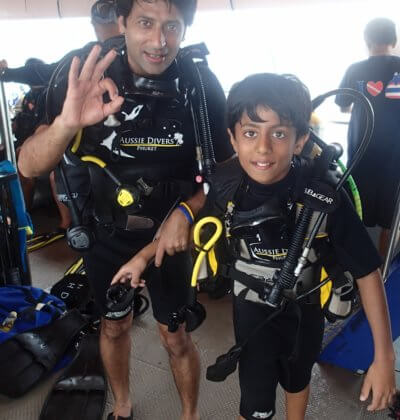
Father and Son PADI Discover Scuba Diving
This could not be further from the truth and places not only the participant in danger but also the other participants and instructor.
Ethical Concerns.
Gibb does raise an ethical point. Here is her view: “Can a child truly understand the risk he or she is taking when he or she goes diving? Children may not understand their own vulnerability until it is too late. Even if a child says that he or she understands that they can die, become crippled, or paralyzed for life as a result of a diving accident, do they truly comprehend what that means? In most cases it is unlikely. Is it ethical to expose a child to a risk that he or she does not comprehend and can therefore not accept?”
It appears that all of the experts agree that is possible of a 10 year old to scuba dive as long as certain considerations are addressed. These are pretty standard between the experts.
1. Does the child have the desire to dive?
2. Does the child have the educational maturity to learn to dive?
3. Does the child have the psychological maturity to dive?
4. Is the child physically mature to dive?
5. Is the child medically fit to dive?
Each child should be address on a case by case situation. There will be some 10 year olds that can dive and some that cannot. To be fair, these common rules should be applied to all divers wanting to learn to dive.
Before committing to allowing these considerations should be discussed honestly between the dive centre, parents and dive instructor. If the child cannot, it is not an issue, they still have plenty of time to prepare for the future.
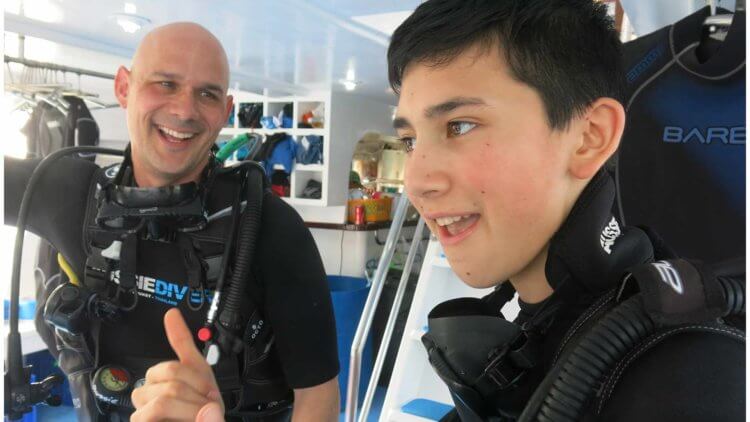
Father Son Scuba Diving With Aussie Divers
Posted in Helpful Diving Info on .
A Diving Community In Phuket
Here at Aussie Divers Phuket we don't just consider ourselves a PADI dive shop, we think of it as more, a big diving family of like minded individuals coming together to enjoy the marine environment through diving in Phuket & Thailand. We are always happy to chat with new divers or old, so please drop by anytime to see what is going on and if you have dived with us or want to dive with us than feel free to like us on Facebook, follow us on Twitter, read our community Dive Blog and generally stay in touch & stay informed.
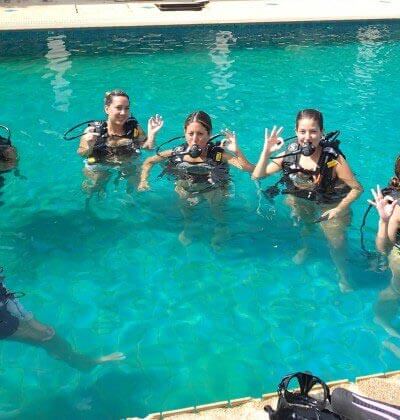 Helpful Diving Info
Helpful Diving Info
Do I Need to Know How To Swim to Scuba Dive?
This is a question that I often get asked, and really it is not as simple as YES or NO. Here is some explanations and reasons why. If you want to become a certified scuba diver by doing the PADI Open Water Diver Course, the answer is yes. In the PADI Open Water Diver Course it is specified that you have to be able to swim continuously for 200 metres. This can be with any stroke however it does need to be continuous without stopping. There is alternate option and that is you do a 300 metre mask, fin and snorkel swim. Some do find this easier to the 200 swim. You also have to be able to tread water or float for at least 10 minut [...]
Read The Story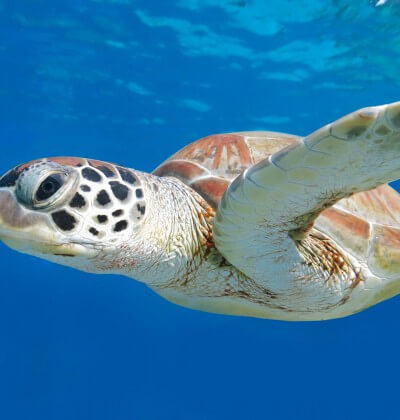 Marine Life
Marine Life
Are Turtle’s the Coolest Underwater Creatures?
See the coolest underwater creatures, our Green & Hawksbill Sea Turtle's whilst scuba diving in Phuket. Recently whist scuba diving in Phuket we have had many opportunities to dive with turtles. Each Time I have seen turtles they have the appearance of being the coolest creatures under the water. No matter how many scuba divers are around they never seem to get ruffled. They casually put on a show for scuba divers of all levels. Turtles can be a scuba diving instructors dream as the are reliably remain in the same territory. They remain mostly in shallow depths which make them easily accessible the those learning to scuba dive s [...]
Read The Story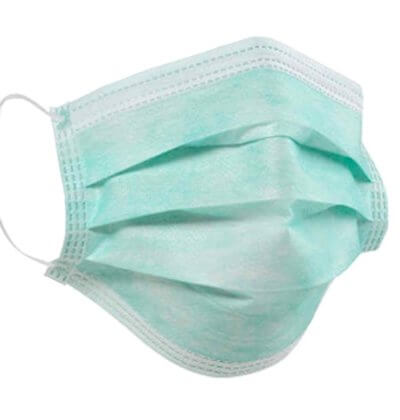 Everything Else
Everything Else
Scuba Diving Uses for a Face Mask Post COVID-19
Scuba Diving Uses for a Face Mask Post COVID-19 The surgical face mask has been around for a long time. Until COVID-19 many of us had never worn one. Now the face mask has become a standard part of daily life for most of us. However, once COVID -19 is done and dusted, what will we do with all the left over face masks? Well hold on to those used face masks as we have come up with 9 exciting new scuba diving uses for the humble surgical face mask post COVID -19. Please note that NONE of these uses have been approved or sanctioned by PADI and it is highly unlikely they will be in the future. WARNING: All models in the phot [...]
Read The Story
